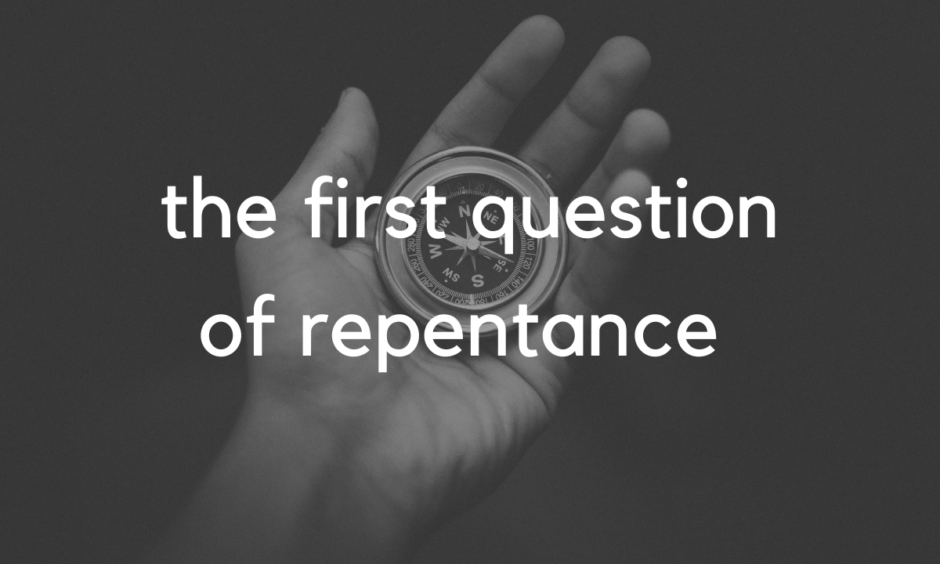So when the woman saw that the tree was good for food, and that it was a delight to the eyes, and that the tree was to be desired to make one wise, she took of its fruit and ate, and she also gave some to her husband who was with her, and he ate. Then the eyes of both were opened, and they knew that they were naked. And they sewed fig leaves together and made themselves loincloths.
And they heard the sound of the Lord God walking in the garden in the cool of the day, and the man and his wife hid themselves from the presence of the Lord God among the trees of the garden. But the Lord God called to the man and said to him, “Where are you?”
Genesis 3:6-9
Jesus’ primary message in his time on earth is summarized in Mark 1:15 as, “‘The time is fulfilled, and the kingdom of God is at hand; repent and believe in the gospel.’” Martin Luther built on these words from Jesus and declared that “the entire life of believers is to be one of repentance.” (Martin Luther’s Basic Theological Writings, p 40). To put it another way – as we go through our lives we are to be continually responding to the nearness of the Kingdom of God by repenting from our actions, thoughts, and even emotions that are not in alignment with the heart of God and replacing those old ways with ways that are fueled by a belief in God.
Repentance is
The word used in the Greek new testament for repentance is metanoia, which means to change one’s mind or to turn around and go a different direction. The image evoked by metanoia is of someone on a journey realizing they’ve gone down the wrong path and as a result turning to go back the way they came to get to the correct path.
The first sin
The first question of repentance shows up not long after the first sin. In Genesis 3 Eve eats the fatal fruit from the tree of the knowledge of good and evil. Adam joins her in eating and as a result they both see the evil and shortcomings in the world – portrayed most immediately by their own sense of nakedness.
You probably know the story. They grab some leaves to cover themselves and then run and hide when they hear God walking in the garden. God’s first words to his creations are significant for how we think about repentance. Here’s how the author of Genesis writes the key moment;
And they heard the sound of the Lord God walking in the garden in the cool of the day, and the man and his wife hid themselves from the presence of the Lord God among the trees of the garden. But the Lord God called to the man and said to him, “Where are you?”
Genesis 3:6-9
Note God’s first question. He doesn’t ask them “What did you do?” or “Why did you eat of the fruit?” Those are the kinds of questions we tend to ask when we want to confront someone (ourselves included) and lead them towards repentance. He also doesn’t simply appear at their side in their hiding place or outright accuse them of doing wrong.
Instead God goes about it differently. He invites Adam and Eve to establish their orientation and location by asking, “Where are you?” He offers a question, not an accusation.
The first essential question in the process of repentance is, “Where are you?” Or, if asking yourself, “Where am I?”
the first question of repentance is; “Where am I?”
The first question of repentance
If repentance is about turning away from a wrong path – physically, mentally, spiritually, or emotionally – then we first must establish where we are before we can identify where we’re to go. It would be near impossible to navigate your way out of the wilderness if you had no idea which direction civilization was. The question of “Where are you?” invites us to take stock of our current state in relation to the Kingdom of God.
This is massively significant for how we begin the process of repentance. Too often we jump to condemning ourselves or others, passing judgment, declaring what was done wrong, and expecting that to cause ourselves (or someone else) to respond with contrition and repentance. Generally that’s not what happens. Instead it causes more running and hiding.
If God himself doesn’t start out with judgment or condemnation, then we should probably avoid doing so as well. Instead, let’s begin with the honest, earnest question; “where are you?”
Putting it into practice
Let’s put this into practice by first applying it to ourselves. Next time you catch yourself lost in the wilderness of anger, of sexual sin, of addiction, or of fear and doubt don’t jump into berating and condemning yourself for your failure. Instead join with the Holy Spirit and ask yourself, “Where am I?”
Four levels of locationality
It’s helpful to evaluate our “whereness” on four levels. As human beings we operate on all these levels simultaneously, so these are somewhat artificial distinctions, but they are helpful in answering the question that God asks of us.
Where am I physically?
Maybe you’ve gotten angry again when you swore you wouldn’t. Where were you physically? Were you over-tired, hungry, or in need of some exercise? If so, repentance might look like acknowledging the choice that led you there and then getting what you need physically and making space in your life for future care to provide what you need.
Where am I mentally?
Maybe you’ve gotten lost in the chaotic forests of fear and anxiety. Discovering your mental location might mean taking a deep breath and tracing your thoughts back to the roots of that fear and anxiety. What are you believing about God and about yourself that’s driving your mind into those places?
Where am I emotionally?
What’s my current emotional state? What emotion am I feeling? What circumstances and/or thoughts have driven those emotions? Maybe you’re feeling overwhelmed with loneliness. Simply naming your emotion and what’s fueling it will be a first step toward repentance and restoration.
Where am I spiritually?
Maybe you’ve wandered far from faith in the last several months, quietly disappearing from the church and fading out of your practices of prayer and reading the Word. If God is approaching you in that wandering, the question of “Where are you?” is an invitation to identify the location of your soul in relation to him.
The beauty of repentance
Regardless of where you are, repentance looks like turning from that place and returning to God. The beauty of all this is that God is the one who comes looking for us. His heart longs to find and restore us. As Jesus said, “the Kingdom of God is near.” Whether your sin has taken the shape of physical sin, mental distortion, emotional confusion, or simply spiritual lethargy, you’re being invited to identify where you are and turn back towards the one who has created and loves you.
‘The time is fulfilled, and the kingdom of God is at hand; repent and believe in the gospel.’





No Comments